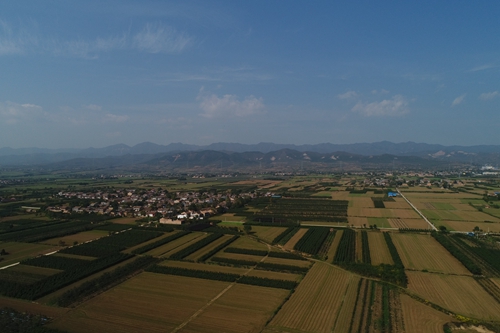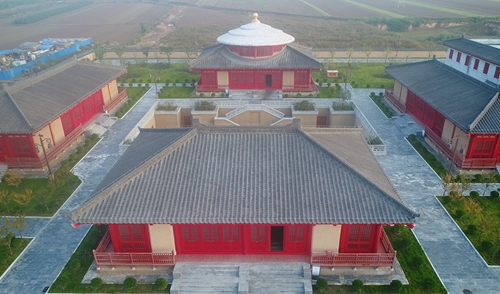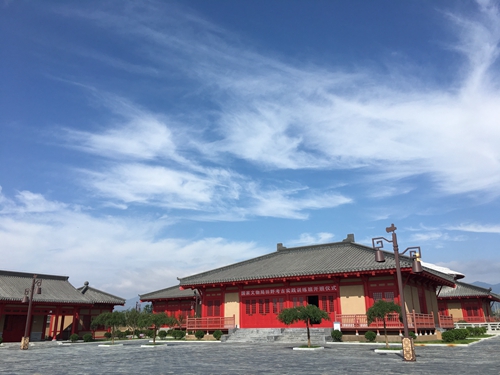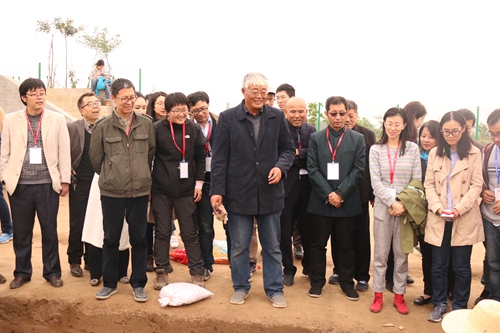Peking University, Nov. 12, 2017: From Handan in Hebei Province to Zhouyuan in Shaanxi Province, the Field Archeology Internship Course independently conducted by Peking University has endured a tumultuous history of 60 years from 1957 to 2017. Through the long-term commitment and diligence of professionals, this had led to the establishment of Peking University’s Field Archeology Internship course as one of the top-tier Archaeology courses in China and the world. Simply from the assessment of the “Top Ten Archeological Discoveries in China” initiated from 1990, Peking University’s Archeology Department have since received 27 of such awards, which is the most stellar amongst Archaeology tertiary institutes.
The ruins of Zhouyuan is located in Fufeng County, Baoji City, in Shaanxi Province, and is considered the birthplace of Zhou Civilization. King Wen of Zhou’s grandfather was the leader of the ancient Zhou Dynasty, who led the entire clan in the late 12th Century BC through harsh terrains before settling down in Zhouyuan. Zhouyuan has since developed into the political and cultural center of the ethic Zhou. Baoji city has invested heavily in the construction of the Zhouyuan Museum and the preservation of the Zhouyuan archaeological base. This base is the residency of Peking University’s Field Archeology Internship team.
 Zhouyuan
Zhouyuan
 Zhouyuan Museum
Zhouyuan Museum
 The Base of Peking University’s Field Archeology Internship
The Base of Peking University’s Field Archeology Internship
The Book of Songs did not hesitate to paint a vivid picture of Zhouyuan’s breathtaking scenery. Zhouyuan, despite having gone through the many vicissitudes of life, still retains splendour traces of the Culture of The ritual and music. Every household had similar transcripts of family injunctions hanged on the doors, the cultural walls of the village were decorated with classical allusions and ancient poems, wedding and funeral ceremonies had complicated proceedings and antique buildings were seen everywhere… As such, Zhouyuan gives visitors the illusion of traveling back in time.
As seen from the perspectives of the students, their lifestyles can be summarised by these few phrases: starting work at sunrise, resting at sunset, having joint meals, and using the phone for no more than three hours a day. Nevertheless, the students not only adapt well, but are also passionate about their simple, orderly and enriching lifestyle as a community. Chen Yanzhen, a Singaporean student, explained shyly that: “The lifestyle here is quite simple and pleasant! Although there are problems in communication due to language barriers, the uncle I am excavating with is particularly patient, and now I am able to understand some dialect. I am grateful for this opportunity!”
Chen Yanzhen
Despite the disparity in lifestyle habits and living environments between Beijing and Zhouyuan, the living conditions are not as arduous as the students had anticipated. When people think of archeology, the images that project onto people’s minds are the hardships of migrant labourers, as well as the shortage of water and electricity. In reality, the students are living comfortably in sanitary conditions. The hostels have rooms of two or five, and each room comes with an attached bathroom and wireless Internet access. As such, these conditions are similar to Peking University’s student dormitories. However, this is the first time that both students and teachers are able to enjoy such privileges due to the recent improvement in accommodation conditions. From the changes of Zhouyuan’s archaeological base, it can be inferred that Archeology has been drastically progressing in recent years, and all aspects of Field Archeology have also kept up with current developments. In a new and conducive environment, this not only enables students to study more productively, but also debunks the negative stereotypes of Field Archeology so as to attract more talented individuals to pursue their ambitions.
At the beginning, Field Archeology was repeatedly coined as “dirt digging” by internship students, as most believe that it is only a monotonous physical activity. However, Field Archeology is in actuality the complete opposite of what it is thought to be. Professor Sun Qingwei, the vice dean of School of Archeology and Museology, and the leader of the 2017 Zhouyuan ruins excavation team, dispels our preconceived mindsets on Field Archaeology by articulating that “Archaeological excavations do consist of certain operation specifications, but the final analysis still comes down to academic issues. The true standard of Field Archeology depends on the application of problem-solving skills to real-life situations. This requires critical thinking and subsequently, physical efforts. Every single step in field excavations, including every shovel of soil, are valuable pieces of information for academic exploration.” In Peking University, even in Field Archeology Internship Course for undergraduates, students have to be adept at addressing serious academic problems. Professor Sun states that the “secret weapon” that has enabled fruitful accomplishments in Peking University’s Field Archeology Internship is the intricate incorporation of the university’s major academic issues and the teaching framework. Field Archeology Course is the fundamental basis of the study of Archeology, and thus is the first step in obtaining information on the subject investigated. Only in the field can we solve the academic issue and lead the reform of the theoretical method on problem guidance.
Field Archeology Internship Courses, according to Professor Sun, is deemed “top priority” when it comes to teaching Archeology. The investments and emphasis placed on Field Archeology in Peking University has enabled the course to be unique and distinct in China and throughout the world. Peking University’s Field Archeology Internship Course has the longest duration and the largest scale of practical courses. Over the past 60 years, it has set up the framework for China’s Field Archeology education curriculum, perfecting and guiding China’s Field Archeology excavation ideals and skills, and hence making gains in both teaching and scientific research.
Here, students can able to reap the benefits of having access to the most comprehensive system of field teaching - field investigation, field excavation, indoor data processing, and report writing are all part of the complete experience of outdoor fieldwork and laboratory analysis.
This year's field excavation site is divided into two areas —the east and the west. The excavation sites are further divided by blocks of five by five meters, and this area is known as the “exploration square”. The east site is where graduate students of the Archeology Department and the excavation training staff of the State Administration of Cultural Heritage are situated. The west site, on the other hand, is where undergraduate students carry out their excavations, where sites, tombs and crypts of the Western Zhou Dynasty were uncovered. More than 300 teachers, students and workers are present in the excavation site, which is an unprecedented amount.
According to the soil quality and color, the students in the exploration site elaborately mark out the relic units that are yet to be excavated. Likewise, every unearthed artefact from each relic unit, whether it is pottery, human bones or other manmade products, have to undergo the strict procedures of mapping, coded recording and scientific collection. The two elements, “science” and “humanity”, are perfectly integrated in Archeology, drawing attention to this area of discipline.
“Life is like a box of chocolates, you never know what you're going to get.” is a line from the movie Forrest Gump. It’s happens to perfectly explain the charm of field archeology-never knowing what you’ll get.
 Professor Lei Xingshan (middle)
Professor Lei Xingshan (middle)
Professor Lei Xingshan from School of Archaeology and Museology compares archeology to reading books without characters. Because different earth layers are just like books which contain many information including activities of different era. Never knowing what they’ll bump into, students are always kept curious. But being a qualified archaeologist requires far more than curiosity. They also need to be sensitive enough to even trivial information in excavation sites, just like a detective.
“PKU has the world’s best archaeology education!” said Lei proudly. It is the only university both at home and abroad that allows students to be involved directly in major field excavation and provides them with such a comprehensive field archaeology internship. Students’ internship reports are so well-written that they can be well published. Combining archaeology internship with leading edge archaeology topics is the key, strengthened Lei.
Apart from PKU, local governments also support the internship greatly, including organizing entertainment activities, providing easy access to health care, etc. University and local government work together to provide better infrastructure to ensure that students focus on archaeology work instead of quit the internship because of the poor working conditions.
Nevertheless, archaeologist never devote themselves to the career just because of material conditions. They stick to the course for the charm of archaeology and the bond between students and professors.
“While I do learn many advanced archaeological theories and methods, I am also inspired by the serious attitude and respect PKU professors having towards their work.” said Hou Xiaogang, an archaeologist enrolled in a training program provided by the School of Archaeology and Museology. Indeed, professors always stay with students in excavation sites. living and working with them. They set good examples for students. This is a PKU tradition, said Lei.
While many can only see the difficulties archaeologists have to overcome in field trips, the excavation sites actually provide archaeologists tons of fun and surprise when they communicate with our forefathers.
Group photo of archaeology majors, 1957 (Su Bai, the fourth from the left at the second row; Zou Heng, the third from the left at the second row)
Find traces of history in Zhouyuan; gain life insights from archaeology. Although one may never know what he or she will get from excavation, there’s no doubt that PKU archaeology will reach a new level after another 60 years.
Written by: Kemerly Wang/ HUANG Yadan
Edited by: WANG Chengsiou
Source: PKU (Chinese)




